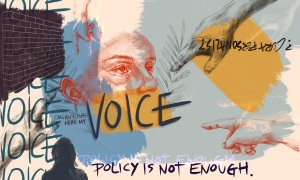My years at Georgetown as a PhD student were undoubtedly the most difficult years of my life. This was not because of the rigor of coursework and research activities, as one might expect. The most burdensome of my experiences was grappling with the reality that my safety as a graduate worker was not a priority of the university.
I was the target of sexual harassment and gender discrimination on more occasions than I can count while I was a graduate worker at Georgetown. This story is just one incident which led me to fear assault on campus in my own research lab.
The research schedule of a graduate student in science is incredibly demanding. In my case, I spent a majority of my time maintaining multiple cell lines to use in my experiments. I was expected to work on weekends in order to both take care of my cells and to push experiments through as efficiently as possible. One summer, I was working in my locked lab on a Saturday afternoon when I heard some noise. Two men from another lab were using a piece of our equipment. I said hello to them and went back to my office to work.
Not too long after, one of the men—another graduate student—appeared in my doorway. I had heard about this student from one of my labmates. Apparently, the student had asked my coworker about “the hot girl” in our lab. I did not appreciate being objectified in this manner in my place of work, but I brushed it off. Thick skin is something women are often encouraged to develop in majority-male workplaces. I, by this point, had certainly developed a thick skin from previous incidents of gender harassment such as this.
So on this Saturday, when the other student declared he had come to my office to chat, I knew this was not a conversation I wanted to engage in while alone. He stood in my doorway, blocking my path to exit as I explained that I was busy with my work, but I would be willing to talk on a weekday. I rationalized with myself that if I had to have a conversation with him, at least other people would be around on weekdays. He suggested we get coffee and asked for my number. I declined this request at least five times over 20 minutes, stating with each declination that we were bound to bump into each other because our labs shared a hallway. Each time he asked he became less friendly and more forceful. Eventually, I caved. He was still blocking my office doorway, and it was the only way I felt I could get him to leave.
Over the following weeks, I received four separate invitations for coffee via text. I declined or ignored all of them. At a program barbecue, he approached me in front of our peers and loudly demanded to know why I had ignored his last text. I replied that I was not obligated to respond—a reply that clearly agitated him. Later, I heard that he had made more objectifying comments about me following that interaction. Several people witnessed his behavior at the barbecue. At this point, we realized the student was harassing multiple women graduate workers in similar ways.
Collectively, we reported the incidents to the Title IX office. A program coordinator was involved to liaise between the Title IX office and the harasser. However, the program coordinator did not follow appropriate Title IX procedures and confronted the harasser without consent from all of the targets of his harassment.
I learned of this mishandling through an email from the Title IX office. While reading the email, I became fearful. I knew he could access my locked lab. He had cornered me in my office before, unprovoked. He clearly had no issue confronting me in front of other people. What would he do now that he knew we had reported his inappropriate behavior?
My lived experiences told me that it wasn’t out of the question that I might find myself in a situation in the future with him where my autonomy and safety could be in jeopardy. I became avoidant. I would walk up three flights of stairs rather than take the elevator, ask labmates to go get ice for me, and trade lab chores, all so I wouldn’t have to walk past his lab. I feared for my safety within my own lab. I started keeping a corkscrew in my desk drawer in case the only way to preserve my physical safety came down to self defense.
The most significant accommodation I made was that I stopped coming to work on weekends. The delay in my scientific progress wasn’t immediate, but cutting from seven work days a week to five caught up with me less than six months later, which resulted in my faculty advisor expressing doubts about my ability to complete my thesis work in a timely manner. My faculty advisor’s expectations for my project required me to work on weekends, which I did not feel safe doing.
Let me be very clear: my capacity to finish my degree was questioned because, out of fear for my own safety, I had to adapt my behavior to avoid harassment and potential assault in my workplace, as a result of failed university processes.
My experiences are not isolated. According to the 2019 Sexual Assault and Misconduct Survey, 35% of graduate women and 21% of graduate men have experienced some type of harassing behavior by someone affiliated with Georgetown. Of those, about half of women and a third of men felt those experiences created hostile environments, interfered with professional performance, and/or limited academic participation. Further, half of graduate women believe it is at least a little likely that they will experience sexual assault while at Georgetown. Let that sink in: half of graduate women come to Georgetown every day with the thought in the back of their minds that today could be the day they experience sexual assault on campus.
There is little trust in the existing structures meant to keep graduate workers safe and well: 72.8% and 66.7% of graduate women and men respectively feel that the university administration is “somewhat concerned” about their wellbeing at most. When I didn’t feel safe at work, I couldn’t do my job well. My negative working experiences during my PhD have led me to leave scientific research altogether. Georgetown failed me as a woman scientist and is failing to cultivate the full range of talent in its graduate workers.
For graduate students working in labs and departments across campus, it is important for harassment issues to be taken seriously. Through the graduate union, Georgetown Alliance of Graduate Employees (GAGE), graduate workers have proposed to the university that they need an additional option to report and resolve harassment cases through the union that would involve a GAGE representative. Georgetown’s survey reinforced what GAGE had already learned through their bargaining survey: graduate workers do not feel comfortable reporting incidents to Georgetown and have a deep distrust of current policies and practices. There is an urgent need to establish an alternative reporting process that centers the needs of and protects targets of harassment.
Supporting GAGE efforts to create effective reporting processes for workplace issues such as harassment and assault is necessary to allow graduate workers to feel safe while completing their degrees and working for the university. The creation of these processes through GAGE is in the best interest of the University, should it choose to be an institution that is truly supportive of its graduate workers. Science cannot advance without contributions from scientists of all genders. Adopting more comprehensive reporting processes is one way to create safe learning and working environments, as well as retain graduate workers in their fields of study. No one should have to choose between their safety and their passion, and it is high time that Georgetown makes the decision to prioritize graduate workers’ safety.




